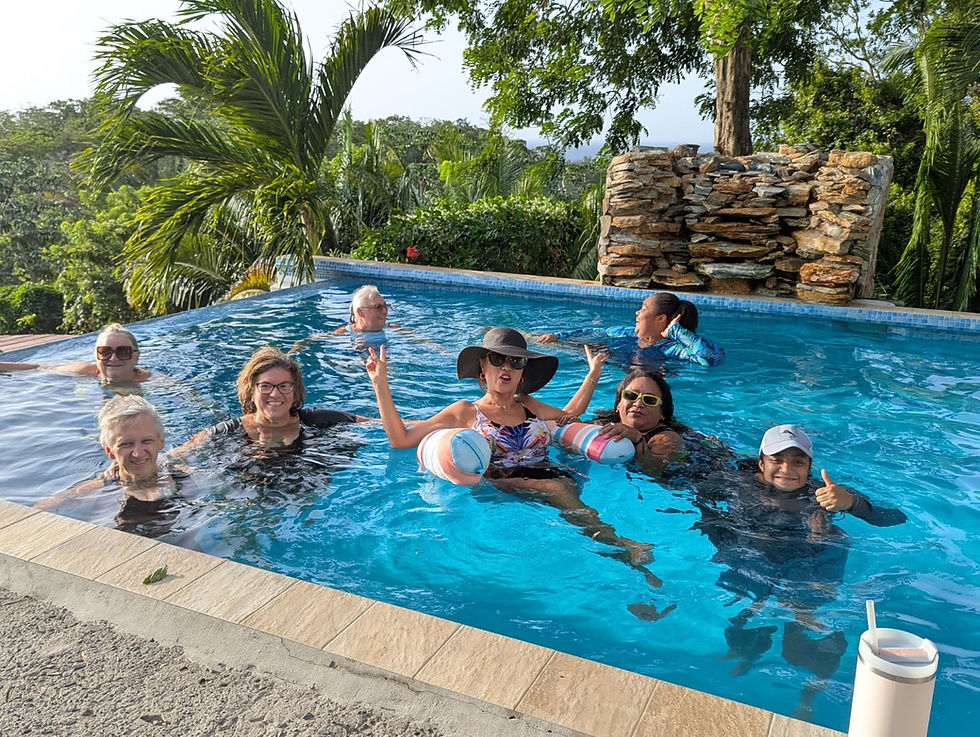100 Lempiras February 2025
- Teresa Morales
- Jun 6, 2025
- 4 min read
Updated: Jun 30, 2025
100 of any thing sounds like a lot. It takes longer to count to 100 than to ten and 100 of some things, like elephants, take up a lot of space. For example $100 to someone who is destitute is a lot of money. $100 can be a life changer for someone who is starving. It can either provide sustenance when used to get food or it can be a weight around someone's neck if used to buy alcohol. $100 dollars can make or break people depending on how it is used.
100 Honduran Lempiras on the other hand are not worth very much in comparison to 100 American dollars. One hundred lempiras, or lemps are worth about four American dollars. Not a lot of buying power in lemps when compared to other world currencies.
But in the hands of the right person 100 lemps can be a powerful thing.

The Tuesday sewing class was abuzz with a kind of nervous energy. The sewing ladies were giddy like teenagers while the teacher was just praying that this whole idea would work without any glitches or hurt feelings. After learning how to sew their first bag and how to critique their work with the eyes of a professional seamstresses, the women had piles of well designed, handcrafted bags. We discussed pricing and that every bag of the same design would be at the same price. Every bag was labeled with their name and the women themselves were to interact with the person who was buying their bag. I taught them a few simple phrases they were to use such as:
"Thank you for donating the fabric" and " Thank you for buying my purse." Some of the students even tried to learn "God bless you." The women were to handle all their own money and transactions.
The ladies were trained and ready.
The mission team was excited and ready.
The door opened and an elephant walked in taking up the whole room of space for himself. The elephant was awkward, causing 30 people in the room to not know what to do, what to say, where to go. Like teenagers at their first dance the room was divided with wallflowers on one side and strangers on the other. The teacher recognized the elephant and having years of experience dancing through parent/teacher conferences, tricky staff meetings and daily greetings of students in various emotional states; the visitors were welcomed and shown to the piles of colorful bags.
Approaching the sewing class, they were somber; not just quiet, but somber; with their heads down, faces glued to their sewing projects, not talking, giddy or smiling. The elephant was consuming them and he needed to go.
"Mi amigas," I said "Vamos a saludar." I had used up all the Spanish I had learned for the day and was praying that one woman would move from her chair.
Insert Jeopardy timer clock and music here.
Gradually, the shy and reserved ladies began herding toward the display table near the mission team members and when a team member asked me about buying a purse I introduced them to the designer. A smile, a translated word of compliment, foreign money given in payment, an exchange of goods and the elephant in the room was growing smaller and smaller. Bravely others followed suit until the wallflowers and the strangers were interacting, smiling and taking photos together.
As the "adioses", "goodbyes" and an occasional "God bless you" were said and done, the mission team left, taking that annoying elephant with them; replacing him with 100 beautiful song birds singing of God's love, acceptance and graciousness. The giddy excitement returned as every lady had sold a purse or multiple purses and they looked at the cash in hand. They gained confidence in their own work, talked to people who were not like them and had gained some income to help their families.
"Miss Teresa" said a student, the poorest of the poor, the oppressed, the ostracized, a dump worker. She had a tear in her eye and as I looked into hers and I remembered the struggles we shared. She was older. Her body ached from years of working in the dump. Her eyesight was fading from days in the harsh sun. She and her family suffered at the hands of those who oppressed the land. And sewing was a struggle for her to the point that my co teacher and I thought this might not be the class for her. But the three of us sewed together, women working for a common goal. She completed a bag and it sold. She had cash in hand just like the better designers and sewers.
"Graciacias Miss Teresa "para tu." she said as she handed me a 100 lempira bill. Choking back a lump in my throat, I didn't want to take it until I realized this was her own money, not the american dollars the women had been paid in. This was her gift to me; a way to show thankfulness and gratitude.
"Gracias mi amiga, Thank you my friend." And that 100 lemps was more precious than 100 American dollars or a whole bag of pirates gold.




Comments